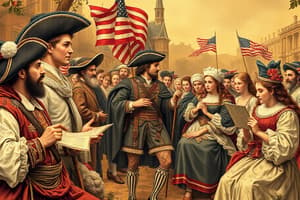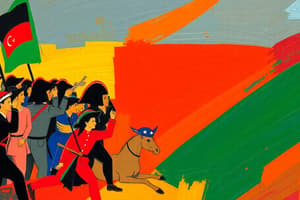Podcast
Questions and Answers
What is ______?
What is ______?
Mercantilism
Who was the ______ king?
Who was the ______ king?
Aztec
What does 'Pueblo' mean in ______?
What does 'Pueblo' mean in ______?
Spanish
How many people and ______ were in the Spanish Armada?
How many people and ______ were in the Spanish Armada?
What is a ______?
What is a ______?
Flashcards are hidden until you start studying
Study Notes
Economic Systems and Exploration
- Mercantilism is an economic theory that emphasizes the importance of accumulating wealth through trade, particularly exporting more than importing, to enhance national power.
- The Spanish Armada was defeated in 1588 by the English fleet, primarily due to adverse weather conditions and superior naval tactics used by the English; this marked a shift in naval dominance.
- Circumnavigation refers to sailing all the way around the world, a feat first completed by Ferdinand Magellan's expedition in the 16th century.
Key Historical Figures
- Christopher Columbus discovered the Americas in 1492, believing he had reached Asia; his voyages sparked extensive European exploration and colonization.
- The Aztec king was Montezuma II, under whose rule the empire faced Spanish conquest led by Hernán Cortés.
- Henry Hudson was an English sea explorer known for his explorations of present-day Canada and parts of the northeastern United States, including the Hudson River.
Significant Events and Concepts
- The Protestant Reformation was a religious movement in the 16th century that challenged the practices of the Catholic Church, leading to the establishment of Protestant denominations.
- The “lost Colony” of Roanoke left behind the word “Croatoan” carved into a tree, indicating a possible location or fate of the settlers.
- Virginia was founded by the English in 1607, with the establishment of Jamestown, the first permanent English settlement in the Americas.
Navigation and Geography
- The Bering Strait is a narrow passage of water between Alaska and Russia that is believed to have been a land bridge for early humans migrating to the Americas.
- A compass is a navigational tool that uses a magnetic needle to indicate the direction of magnetic north, aiding in maritime navigation.
- An astrolabe is an ancient instrument used for solving problems related to time and the position of the stars, crucial for navigation at sea.
- A caravel is a small, highly maneuverable sailing ship developed in the 15th century that played a significant role in the Age of Discovery.
Cultural Elements
- "Pueblo" is a Spanish term meaning "village" and is used to describe the communal dwellings of Native American tribes in the Southwestern United States.
Studying That Suits You
Use AI to generate personalized quizzes and flashcards to suit your learning preferences.


